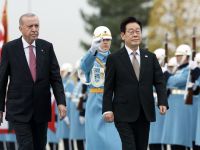President Pervez Musharraf heads west Wednesday to meet with George W. Bush and other world leaders, hoping to parlay support for the war on terrorism into added diplomatic backing for his position at home.
Musharraf will meet with President Bush on Saturday outside the UN General Assembly in New York after a visit to London to see Prime Minister Tony Blair. He will confer with President Jacques Chirac in Paris on the way back.
The high-profile trip will be in sharp contrast to the cool reception given by the international community to the Pakistani army general after he took power in a 1999 military coup here.
Musharraf's unequivocal support for the US-led military campaign to root out terrorists in neighboring Afghanistan has produced a diplomatic and economic windfall for Islamabad.
The move earned him a lifting of sanctions imposed on Pakistan for its nuclear weapons program and the military coup, as well as a rescheduling of some of the country's 37 billion dollar debt.
But as the head of an Islamic state, where feelings about the US attacks on fellow Muslims run high in many quarters and could grow as the war drags on, Musharraf needs continued justification for his position.
A government spokesman said the president is confident of the support of most of his countrymen. But he added: "Pakistan doesn't have to convince the world leaders about the difficult situation that exists here."
Since the September 11 terror attacks on the United States, Musharraf has welcomed here US Secretary of State Colin Powell and Defence Secretary Donald Rumsfeld. But he has yet to meet with Bush.
The Islamabad government spokesman said the discussions, organized at Bush's invitation, would be "substantive" and would underscore "the renewed warmth in the Pakistani-US relationship."
Riffat Hussain, head of the strategic studies department at the Quaid-e-Azam University in Islamabad, said the meeting could "help Musharraf overcome the so-called legitimacy crisis for his government."
"More significantly it also marks recognition of Pakistan as a de facto nuclear weapons state," Hussain said.
He said Musharraf would likely seek to broaden and deepen strategic cooperation with the United States and persuade Washington to become more involved in Islamabad's dispute with India over the territory of Kashmir.
Signs of Musharraf's new diplomatic luster abound since his decision to accord the Americans staging facilities and use of Pakistani air space for the Afghan campaign, and to cooperate in intelligence sharing.
Foreign leaders and dignitaries have been trooping to his door and UN Secretary General Kofi Annan called him twice to come to the United Nations to share his views, officials here said.
But his pro-American stance is also a gamble.
Pakistan is home to several radical movements that feel closer to their Taliban neighbors in Afghanistan -- often coming from the same ethnic groups -- than they do to the American "infidels".
Protests have erupted on the streets of major cities and several thousand people from the Pashtun tribes in Pakistan's west and northwest have crossed over into Afghanistan to fight alongside their Taliban brothers.
So far, Musharraf has kept the situation under control. But analysts agree that the longer the war goes on, the greater the risk Pakistan will be destabilized.
Musharraf and other officials here have been pressing for efforts to "fast track" a political solution for Afghanistan -- ISLAMABAD, (AFP)
© 2001 Al Bawaba (www.albawaba.com)







